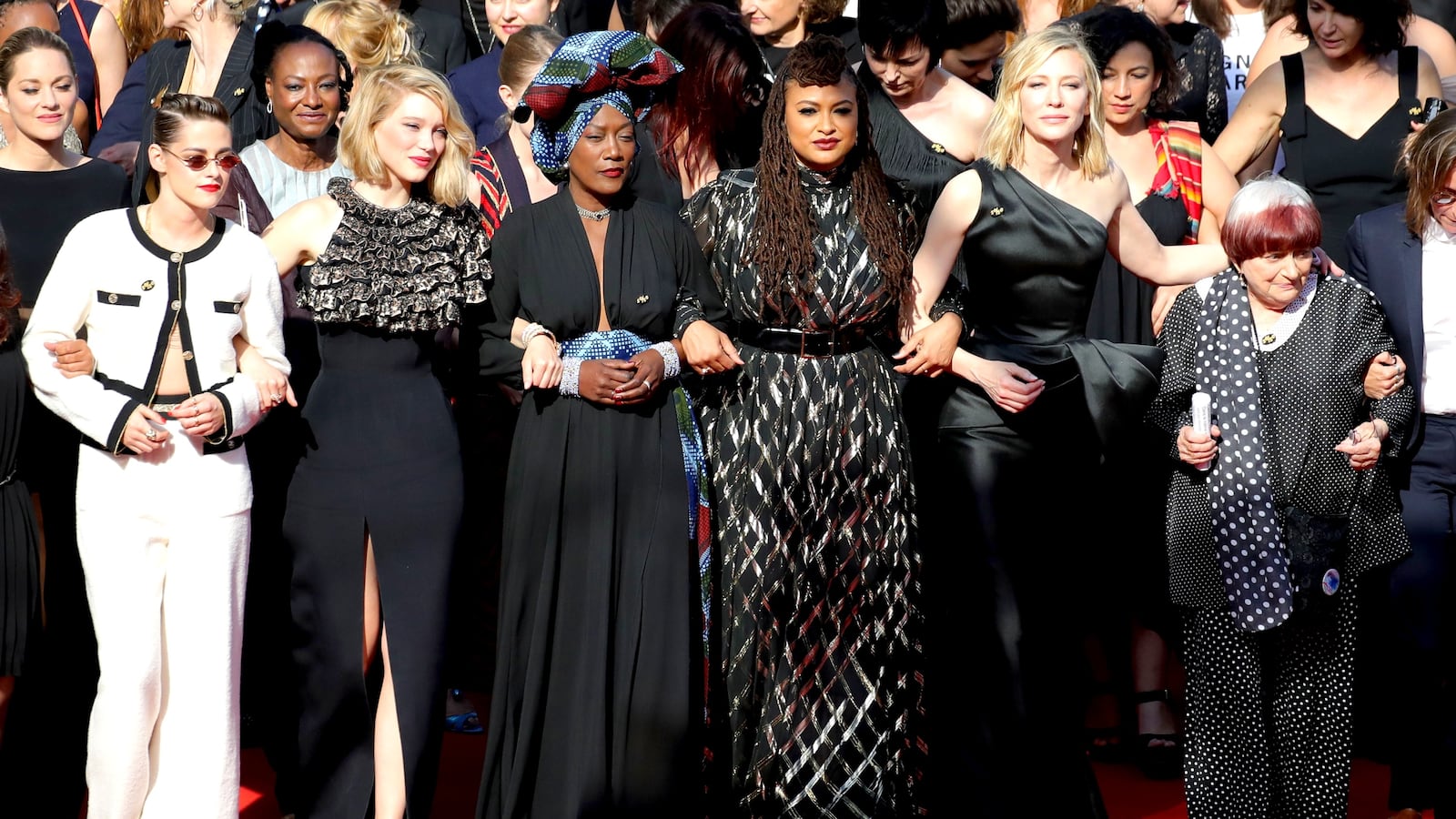CANNES, France – Harvey Weinstein was too arrogant to realize the women of cinema would one day symbolically slay him and bar him from the mythic gates of the Croisette.
Even if Weinstein had tried to crash the Palais Saturday night, he’d have been blocked—literally. Eighty-two actresses and female directors, led by Cannes jury head Cate Blanchett, massed on the famous red-carpeted steps, linking arms in a fiery protest for equal pay, equal opportunity, and an end to the sexual exploitation of women.
The women marched in solidarity with writer-director Eva Husson, 41, the only female French director with a film in competition at Cannes, just before her premiere. And the number 82 represented the total number of films by female directors that have screened in competition at Cannes since 1946, compared to 1,645 films directed by men.
But the Islamic State fighters in Husson’s harrowing new feminist war thriller, Girls of the Sun, are smarter than Weinstein. They underestimate no one. They’re terrified of the furious Kurdish female soldiers they once may have raped who are now gunning for them. If they’re killed by a woman, they won’t go to paradise.
Amid the lawlessness and extremism of Northern Iraq, where the movie takes place, men can easily wind up dead—not, it goes without saying, in cushy exile in Arizona allegedly getting therapy for anger and sex-addiction issues.
Female Yazidi rape victims from Kurdistan who escape their captors and fight back with automatic rifles aren’t called “brave,” nor do they get book deals. They’re often ostracized by their families, abandoned by their husbands and blamed for bringing dishonor to the clan.
“If it were oil, not milk, that came from our breasts,” Iranian actress Golshifteh Farahani, playing the all-female unit leader Bahar, says bitterly near the end of the film, “then the coalition forces would have come sooner.”
Watching Girls of the Sun in glossy, glam Cannes is like walking through a black mirror and entering an ugly, brutal land 2,600 miles east where the fictional heroines, based on the real-life experiences of some of the most disenfranchised women on earth, were #MeToo before it was a hashtag.
They’re also warriors as much if not more so than they are victims.
“Fighting is victory!” Bahar yells to her troops in the film.
Farahani anchors the film as commandingly as she does her unit of ragtag, traumatized but ultimately triumphant combatants in the Kurdish Army who take back the town where her character was kidnapped and sold into slavery.
Emmanuelle Bercot plays a French war correspondent with an eyepatch embedded with the female forces who is loosely based on American war reporter Marie Colvin, who was killed in Homs, Syria, by the Syrian Army in 2012.
Some early reviews were mixed to harsh, with male critics calling the film “naïve” and another terming it “pedantically commonplace” and “stuffed with old chestnuts.” Everyone seemed concerned that the movie wasn’t subtle enough. “Nuance” was needed.
A colleague at the press screening who raved about the “moving” and “meaningful” 82-women protest complained that the film had been too “melodramatic.”
I wonder if, in another era, when writers—and people—weren’t so careful not to offend, more would have been made of the spectacle of powerful women in haute couture and million-dollar jewelry protesting sexual harassment prior to a movie inspired by the kind of articles that describe the agony of a 12-year-old Yazidi girl who was raped for days on end despite heavy bleeding.
Times Up? For who? At least 3,000 Yazidi women are still believed to be in captivity, trafficked as sex slaves today.

Though we’ve read about the nightmarish daily rapes and slave auctions that the Yazidi women have endured in articles written by journalists like The New York Times’ Rukmini Callimachi, it’s quite another thing to see the torture and helplessness play out on a big screen.
I was reminded of the years before #MeToo, when the phrase “rape culture” grew in frequency in the U.S. I wondered about the thousands of Bosnia Muslim women gang-raped by Serbs during the Yugoslav wars in the 1990s and what they would make of the American concept of rape culture. The majority of their rapists were never prosecuted and 25 years later the victims are forced to see their attackers regularly around town, in coffee shops.
But #MeToo was born in part in Cannes, one of Weinstein’s favorite hunting grounds. Husson conceived of Girls of the Sun before #MeToo but because of Weinstein, the protest at her premiere became a historic, karmic event at the festival.
To see the dots connect between the parties, yachts and screening rooms of Cannes and a part of the world where 10-year-old girls fetch the highest prices at ISIS rape auctions is to get whiplash—in a very necessary way.
Though the word “Yazidi” is not mentioned in the movie, the press notes indicated that Husson was inspired to write Girls of the Sun after reading about Yazidi female combatants from Iraq and Syria that formed during the still-ongoing, seven-year Syrian war.
Yazidis are a minority population whose beliefs draw on Christianity, Islam and Zoroastrianism, and as such are considered some of the worst “infidels” by ISIS. In August 2014, close to when the film begins, more than 100,000 people fled up to Mount Sinjar to escape ISIS.
Thousands of men were executed and more than 6,000 women and girls were abducted and sold as sex slaves, some as often as every three weeks.
Girls of the Sun has a happy-ish Hollywood ending, which is another reason it may get poor to lukewarm reviews. But Farahani’s battle cry is authentic enough to be understood by both ISIS fighters and male predators everywhere, like Weinstein.
“When they hear our voices,” she says in the film, “they shake in fear.”






